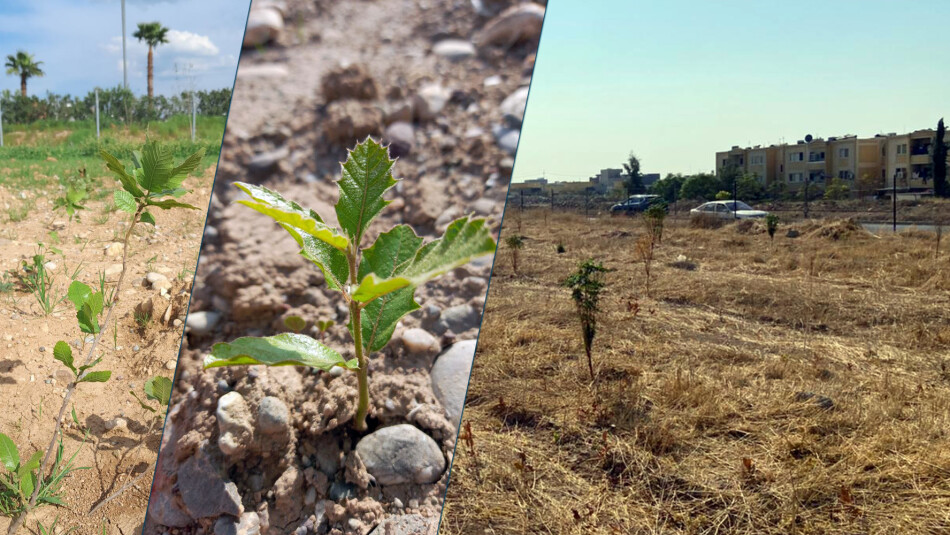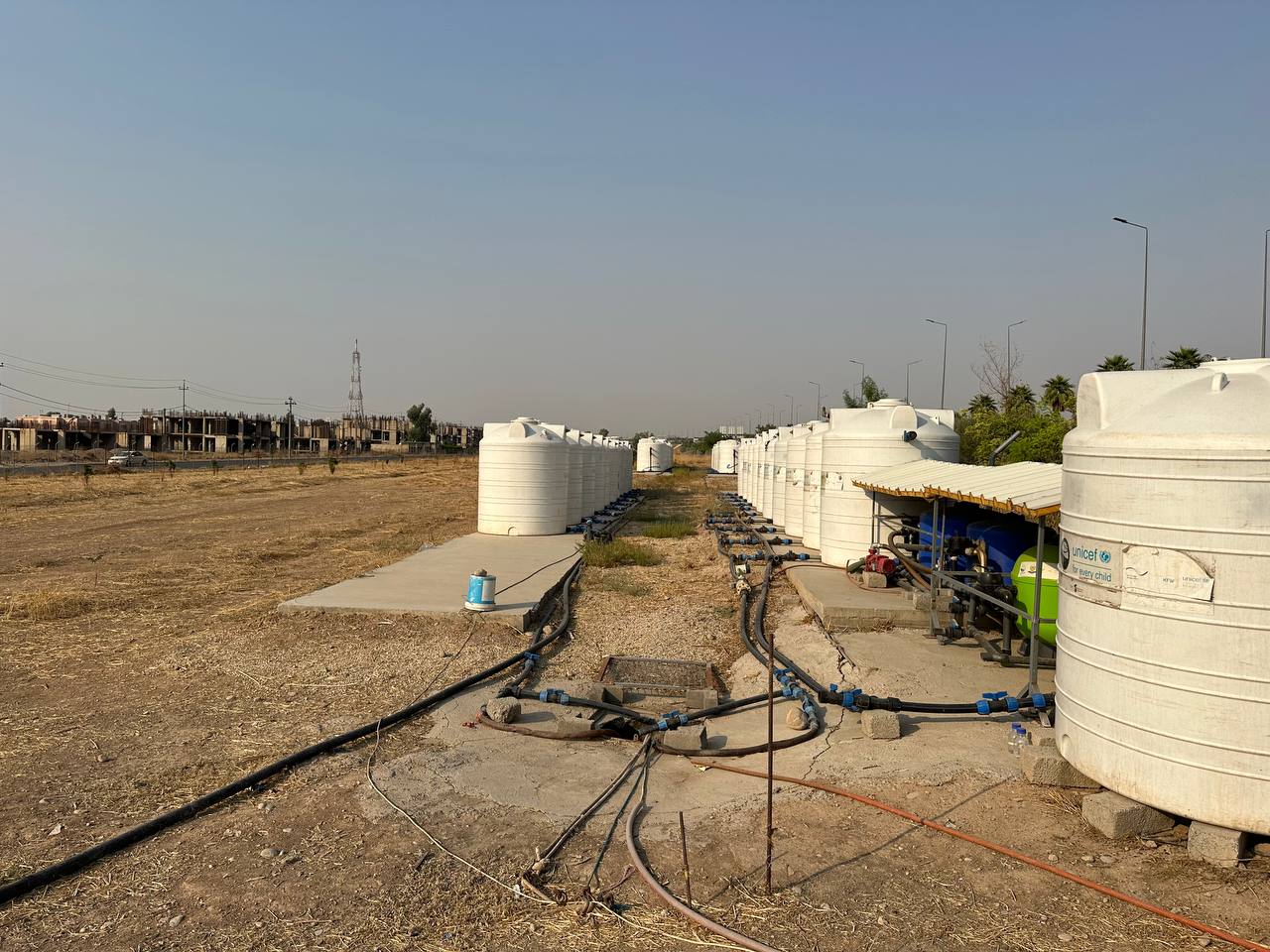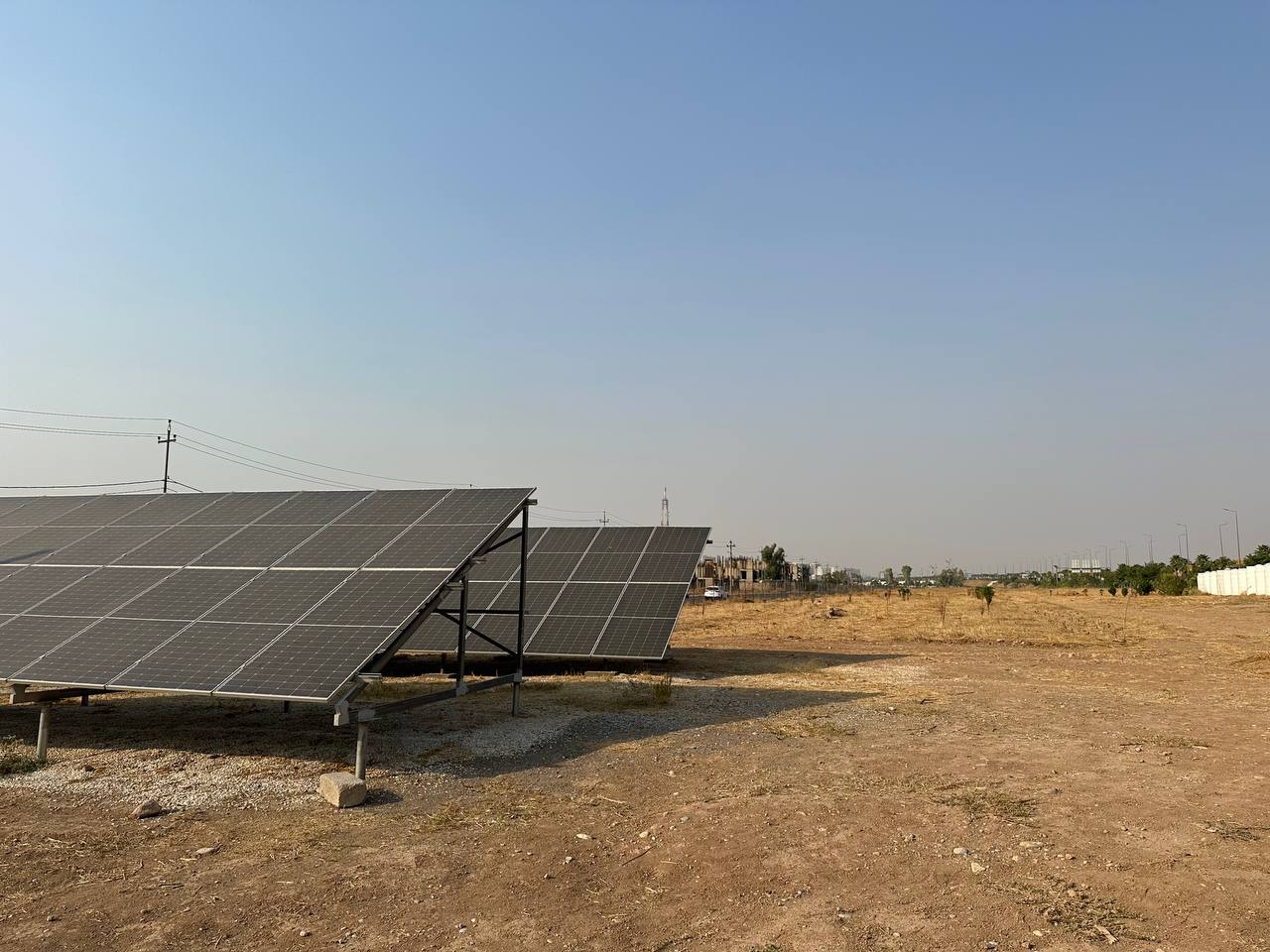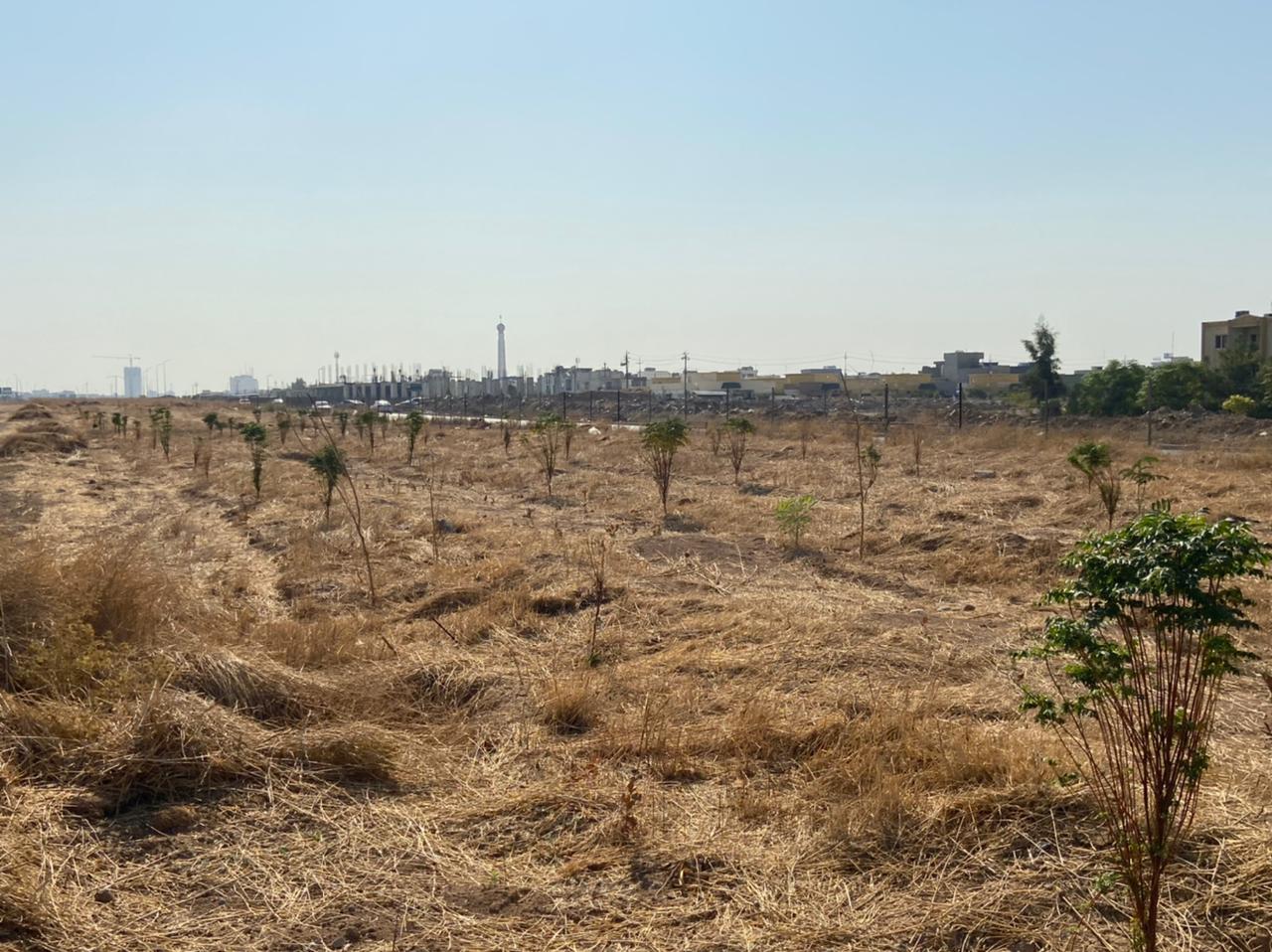
A densely reduced forest of trees in Erbil, the capital of the Iraqi Kurdistan Regional (IKR), between two busy streets and the main streets of the city, which tens of thousands of vehicles pass through daily and spread gas and gasoline smoke in the air of Erbil.
The project, which is being implemented by Hasar Organization on an area of 180,000 donums (18,000 acres), is completely environmentally friendly, waste water is reused after treatment to irrigate trees, uses solar energy to generate electricity, and creates job opportunities for villagers.
The goal is to complete the city's green belt project by planting one million oak trees. This was actually the government's responsibility, but hundreds of volunteers are working for Hasar and have been able to plant 300,000 trees in the past five years and by the end of this year (2024) they want to reach 700,000.
A great challenge
When Gashbin Idris, Head of Hasar, and his team started the move five years ago, it was not easy.
Idris said they had to think simultaneously about how to clean up 18,000 acres of land, how to get trees, how to water and generate enough electricity to meet the project's goal of protecting the environment.
The 38-kilometer street, known as Erbil 120m, is one of the busiest and main streets. It was opened several years ago and became a major government campaign for prosperity, but the important aspect of the project, the green backbone, was neglected.

The Erbil green belt project was supposed to be implemented along a 120-meter street and 150 trees, according to the project map and two kilometers deep around both streets.
Gashbin stressed that the 18,000 acres of land on which the project is being implemented was a garbage dump five years ago, so the first step was to clean the place and then directly wired, so as not to become a garbage dump again.
“500 young people are volunteering in this project,” Gashbin said. “They have been involved in cleaning the area. Now they plant, water and monitor growth of trees.”
500 young people are volunteering in this project
Zahra Tahir, who worked as a volunteer at the beginning of the project and is now an employee of the organization and supervises the team of volunteers, said, "We have worked day and night with the volunteers to make this part of the city green.”
“I feel very happy because I am witnessing a situation that few people may see. Moment by moment a broad network of young people, regardless of gender, religion and opinion, big and small, share the same goal Against climate change.”
According to statistics and estimates of the Erbil Parks Engineering Directorate in 2019, almost 450,000 trees of various kinds were planted up to the end of May, and plans to plant another 100,000 trees by the end of this year.
The cost of the project has reached $300,000 and 30% of the work has been completed. The costs include cleaning the area to fencing, buying plants, water preparation for trees, electricity, tree planting and monitoring.
A tree forest in Erbil
The trees in the center of Erbil are slowly growing, ranging in height from 20 to 40 centimeters and more. This is the first time trees have been planted on such a large scale in the city center.
Every year during the planting season, the project volunteers announce a tree planting campaign for the villagers, encouraging them to collect and plant trees.
The organization pays the villagers a certain amount of money in exchange for collecting and planting the oak trees, which has become a job opportunity for the villagers. The volunteers then bring the trees back to Erbil and plant them.
“We will gather the people of the village and explain the purpose of the project to them, and they will help us... Another goal is to protect the plants from extinction, so that they can come back into the project,” Gashbin added.

The tree planting system is similar to the natural tree forest system of the IKR.
The spacing between the trees grown in Erbil in each group is tight, 20 to 25 cm.
"The trees have been planted in groups, each group has 36 trees, but the distance between the groups is about two meters," according to the project supervisors.
The man-made forest is imitating natural forests and they think it will succeed that way.
Trees are naturally slow growing, planted trees are between 20 and 40 cm tall, or more, and some are smaller.
The "dense forest" is expected to reduce air pollution in Erbil, which suffers from smoke and polluted air.
In the center of Erbil, there are more than 1,100 private generators to provide electricity to households, in addition to hundreds of generators in public places, public offices and companies. With hundreds of factories and refineries that affect air pollution.
According to the Ministry of Health, 9,911 new cases of cancer will be registered in the Kurdistan Region in 2023 alone, half of which were in Erbil.
Lung cancer is the second most common cancer in the world.
Dr. Bakhtiar Mohammed, an environmental expert in Erbil, says 85% of air pollution in Erbil is related to refineries, most of which are located in the western and southwestern parts of Erbil.
"Refineries emit about 85 kilograms of carbon dioxide per liter of crude oil, and 2.2 kilograms of carbon dioxide per liter of gasoline," Bakhtiar said.
According to the 2018 statistics of the Kurdistan Regional Government (KRG) Statistical Board, 1.1 million people live in the center of Erbil and the greenery rate in the city is approximately above 15%.
Head of Hasar said the plan is to create a miniature forest in the outskirts of Erbil by 2030. “We aim at planting 1 million trees by 2030.”

17 local and international organizations, companies and government institutions are supporting the project in different ways, while 150 permanent members voluntarily support the project, who live inside and outside the IKR.
Sangar Akrayi, one of the people who generates financial support for the project from the United States, said, "I saw the project through social media, a sense of responsibility and patriotism made me support this project to combat climate change.”
Use of waste water for irrigation
In order to avoid wasting water, Hasar uses reuse of black water to irrigate the forest.
Water reuse and recycling equipment has been installed in the project, the work is being done with the assistance and coordination of the Erbil Water and Irrigation Directorate.
“The waste water of the fifth neighborhood of Hasarok in Erbil is re-filtered and used to irrigate trees... 300 cubic meters of water is recycled daily.”
Hasar uses a different irrigation technique to ensure that the treated water is not wasted and that it is enough for the forest.
“The technique is called deep root irrigation,” Idris added. “The process is that a hole is made next to each tree to a depth of 30 centimeters so that the trees can get water from the depths.”
For the entire project, Hasar relies on solar energy to generate electricity, because installing generators harms the environment, climate and the forest itself.
Thousands of vehicles travel on the 120-meter street in Erbil daily, and their gas and petrol fumes mix with the air in Erbil.
There are more than two million vehicles in the IKR, most of which are in Erbil province, and run on gasoline and gas, which are a source of air pollution.
“The carbon dioxide emitted into the air by burning each liter of gasoline is 2.2 to 2.4 kilograms depending on the quality of the gasoline, but for gas it is between 2.6 and 2.9 kilograms It can convert up to 180 grams of carbon dioxide into oxygen,” Dr. Bakhtiar Mohammed added.
"It takes about 40 trees to use 2 to 3 liters of gasoline daily to filter toxic gases such as carbon dioxide and methane.”
"That's why we chose trees in this project," Gashbin said. "Oak trees are one of the trees that can convert the most carbon dioxide into oxygen.”
Oak tree is a native tree of the region. It is one of the best trees for water and air change. It is resistant and requires little water.
"It is a native tree of the region, one of the best trees for climate change, resistant, requires little water, is easily and cheaply available, so a good amount of greenery can be provided with a small economy," he said.
Obstacles and challenges
The small forest in Erbil is not without obstacles, as Gashbin says, “Because it is the first time that trees are planted in large quantities in the city, it has faced obstacles area and temperature.”
However, since the project began, they have continued to experiment to adapt it to the urban environment.
In general, the trees appear unserved, some of them are lost under the cover and unserved, many of the trees have completely dried up. Others have broken seedlings and appear as if they have stopped growing.
"We have nothing to do with the project, so we have no cooperation," said Dilshad Hirani, director of the Erbil Environmental Office.
The planted trees, which are growing in addition to their environmental aspects, testify to the collective work of hundreds of people to cope with climate change.